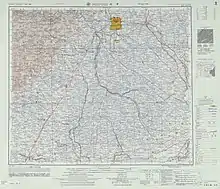Pei-p'ing
English

PEI-P’ING (PEIPING) 北平 (1954)
Alternative forms
- Peiping (also from Wade–Giles)
- Beiping (also from Hanyu Pinyin)
Etymology
From Wade–Giles romanization of Mandarin 北平 (Pei³-pʻing²).[1][2]
Proper noun
Pei-p'ing
- (obsolete) Beijing.
- 1944, A. G. Wenley, John A. Pope, China, Lord Baltimore Press, page 6:
- Pei-p'ing (Peking) has many times been the capital of China and in recent centuries has been the center of intellectual and cultural activities.
- 1979, Shirley Carpenter, Atlas of Man and His World, Aldus Books, →ISBN, page 124:
- The capital, Ulan Bator, has been linked by rail with the Trans-Siberian Railway at Ulan-Ude and with Pei-p'ing (Peking) in the south.
- 2005, Lothar Ledderose, “Tung Ch’i-ch’ang’s Treasure Trove [董其昌的寶藏]”, in 故宮學術季刊, volume 23, number 1, →ISSN, →OCLC, archived from the original on 29 March 2023, page 416:
- In Berlin Kümmel avidly collected the pertinent new literature published in Shanghai and by the Palace Museum in Pei-p’ing after its foundation in 1925.
- 2007, Lahui Ako, “Beijing Sheng Into the 21st Century”, in Lahui Ako's Upstream Through Endless Sands of Blessings, CBS Publishers & Distributors, →ISBN, →OCLC, page 508:
- Later on during the reigns of the first two emperors of the Ming dynasty (1368-1644) Nanjing became their capital, and the old Mongol capital in the north was renamed Pei-p’ing (Northern peace). The third Ming emperor, however, restored it as the imperial seat of the dynasty and gave it a new name “Beijing” (northern capital).
Since then, Beijing has remained the capital of China except for a brief period between 1928 and 1949 when Chiang Kai Shek’s Nationalist government moved the capital down to Nanjing again (although the capital was again relocated to Chungqing during WWII). During that time, Beijing again assumed the old name of Pei-p’ing which, ironically, is still used by the Nationalist government in Taiwan when referring to this city.
- 2011, R. Conrad Stein, World War II in the Pacific: From Pearl Harbor to Nagasaki, Enslow Publishers, →ISBN, →LCCN, →OCLC, page 17:
- In 1937, an ancient stone bridge, named after the explorer Marco Polo, that spanned a river near the Chinese city of Pei-p’ing (now Beijing) became part of history.
- 2012 August 6, James Fallows, quoting Chas Freeman, “Chas Freeman on Why People Say 'Beizhing'”, in The Atlantic, archived from the original on 07 August 2012:
- At the conclusion of the 1926 - 28 "northern expedition," Chiang proclaimed victory and renamed Beijng as "Beiping" ("northern peace"). In the Wade-Giles orthography that prevailed at the time, this was written "Pei-p'ing." Westerners naturally pronounced that as "Pay Ping." John Foster Dulles and others, having been influenced by the "China Lobby," (some of which understood the political subtleties of the Chinese language involved) adamantly enforced the use of Pei-p'ing as the name of the (bogus) capital of the (Soviet puppet) People's Republic of China on pain of political chastisement. Saying "Peking" was career-threatening.
When I joined the Foreign Service in 1965, I was duly counseled to avoid the use of Peking and to say Pei-p'ing instead.
References
- “Selected Glossary”, in The Cambridge Encyclopedia of China, Cambridge University Press, 1982, →ISBN, →LCCN, →OCLC, pages 476, 483: “The glossary includes a selection of names and terms from the text in the Wade-Giles transliteration, followed by Pinyin, […] Pei-p'ing (Beiping) 北平”
- “Languages Other than English”, in The Chicago Manual of Style, Seventeenth edition, University of Chicago Press, 2017, , →LCCN, →OCLC, page 652: “Wade-Giles Postal atlas Pinyin […] Pei-ching (Pei-p’ing) Peking (Peiping) Beijing”
This article is issued from Wiktionary. The text is licensed under Creative Commons - Attribution - Sharealike. Additional terms may apply for the media files.